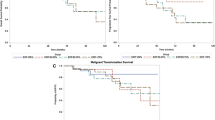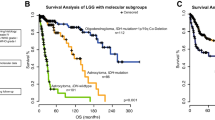Abstract
The prognosis of patients with WHO grade III gliomas is highly dependent on their genomic status such as the isocitrate dehydrogenase (IDH) 1/2 mutation and1p/19q co-deletion. However, difficulties have been associated with determining which tumors have certain genomic profiles by preoperative radiographical modalities, and the role of surgical resection in achieving better outcomes remains unclear. This retrospective study included 124 consecutive patients with newly diagnosed grade III gliomas. The genomic status of IDH1/2 and 1p/19q was analyzed in these patients. Tumors were then divided into 3 subgroups based on their genomic status; the IDH 1/2 mutation with the 1p/19q co-deletion (1p/19q co-del), the IDH 1/2 mutation without the 1p/19q co-deletion (non-1p/19q co-del), and the IDH 1/2 wild type (IDH wt). Survival times were compared between patients who underwent gross total resection and those who did not (GTR versus non-GTR). The relationships between genomic statuses and MR imaging characteristics such as ring-like or nodular enhancements by gadolinium, and very low intensity on T1-weighted images with blurry enhancements (T1VL) were also examined. Among all patients with grade III gliomas, GTR patients had longer median survival and progression-free times than those of non-GTR patients (undefined versus 87 months, p = 0.097, and 124 versus 34 months, p = 0.059, respectively). No significant differences were observed in survival between GTR and non-GTR patients in the 1p/19q co-del group (p = 0.14), or between GTR and non-GTR patients in the IDH wt group (26 and 27 months, p = 0.29). On the other hand, in non-1p/19q co-del group, survival was significantly longer in GTR patients than in non-GTR patients (undefined versus 77 months, p = 0.005). Radiographically, T1VL was detected in most tumors in the non-1p/19q co-del group (78.2 %), but only 6 (21.4 %) and 17 (41.5 %) tumors in the 1p/19q co-del and IDH wt groups, respectively. A correlation was not found between other genomic subgroups and MR imaging findings. Strict surgical removal is important to improve the prognosis of patients with grade III gliomas, especially for tumors with the IDH 1/2 mutation without the 1p/19q co-deletion. The MR finding of T1VL can be used to select candidates for more radical resection.







Similar content being viewed by others
Abbreviations
- CT:
-
Computed tomography
- FLAIR:
-
Fluid-attenuated inversion recovery
- GTR:
-
Gross total resection
- IDH:
-
Isocitrate dehydrogenase
- MGMT:
-
O6-methylguanine-methyltransferase
- MR:
-
Magnetic resonance
- OS:
-
Overall survival
- PFS:
-
Progression-free survival
- WHO:
-
World Health Organization
References
Louis ND, Ohgaki H, Wiestler OD, Cavenee WK (eds) (2007) WHO classification of tumours of the central nervous system. IARC Press, Lyon
Balss J, Meyer J, Mueller W Korsthunov A, Hartmann C, von Deimling A (2008) Analysis of the IDH1 codon 132 mutation in brain tumors. Acta Neuropathol 116(6):597–602
Cairncross G, Wang M, Shaw E, Jenkins R, Brachman D, Buckner J, Fink K, Souhami L, Laperriere N, Curran W, Mehta M (2013) Phase III trial of chemoradiotherapy for anaplastic oligodendroglioma: long-term results of RTOG 9402. J Clin Oncol 31(3):337–343
Ichimura K, Pearson DM, Kocialkowski S, Bäcklund LM, Chan R, Jones DT, Colins VP (2009) IDH1 mutations are present in the majority of common adult gliomas but rare in primary glioblastomas. Neuro Oncol 11(4):341–347
Ohgaki H, Kleihues P (2005) Population-based studies on incidence, survival rates, and genetic alterations in astrocytic and oligodendroglial gliomas. J Neuropathol Exp Neurol 64(6):479–489
Parsons DW, Jones S, Zhang X, Lin JC, Leary RJ, Angenendt P (2008) An integrated genomic analysis of human glioblastoma multiforme. Science 321(5897):1807–1812
Shibahara I, Sonoda Y, Kanamori M, Saito R, Yamashita Y, Kumabe T, Watanabe M, Suzuki H, Kato S, Ishioka C, Tominaga T (2012) IDH1/2 gene status defines the prognosis and molecular profiles in patients with grade III gliomas. Int J Clin Oncol 17(6):551–561
Sonoda Y, Kumabe T, Nakamura T, Saito R, Kanamori M, Yamashita Y Suzuki H, Tominaga T (2009) Analysis of IDH1 and IDH2 mutations in Japanese glioma patients. Cancer Sci 100:1996–1998
Sonoda Y, Yokosawa M, Saito R, Kanamori M, Yamashita Y, Kumabe T, Watanabe M, Tominaga T (2010) O(6)-Methylguanine DNA methyltransferase determined by promoter hypermethylation and immunohistochemical expression is correlated with progression-free survival in patients with glioblastoma. Int J Clin Oncol 15(4):352–358
van den Bent MJ, Carpentier AF, Brandes AA, Sanson M, Taphoorn MJ, Bernsen HJ et al (2006) Adjuvant procarbazine, lomustine, and vincristine improves progression-free survival but not overall survival in newly diagnosed anaplastic oligodendrogliomas and oligoastrocytomas: a randomized European organisation for research and treatment of cancer phase III trial. J Clin Oncol 24(18):2715–2722
van den Bent MJ, Dubbink HJ, Marie Y, Brandes AA, Taphoorn MJ, Wesseling P et al (2010) IDH1 and IDH2 mutations are prognostic but not predictive for outcome in anaplastic oligodendroglial tumors: a report of the European Organization for Research and Treatment of Cancer Brain Tumor Group. Clin Cancer Res 16(5):1597–1604
Yan H, Parsons DW, Jin G, McLendon R, Rasheed BA, Yuan W et al (2009) IDH1 and IDH2 mutations in gliomas. N Engl J Med 360(8):765–773
Sonoda Y, Kumabe T, Watanabe M, Nakazato Y, Inoue T, Kanamori M, Tominaga T (2009) Long-term survivors of glioblastoma: clinical features and molecular analysis. Acta Neurochir (Wien) 151(11):1349–1358
Sonoda Y, Tominaga T (2010) 2-hydroxyglutarate accumulation caused by IDH mutation is involved in the formation of malignant gliomas. Expert Rev Neurother 10(4):487–489
Cairncross G, Berkey B, Shaw E, Jenkins R, Scheithauer B, Brachman D et al (2006) Phase III trial of chemotherapy plus radiotherapy compared with radiotherapy alone for pure and mixed anaplastic oligodendroglioma: intergroup radiation therapy oncology group trial 9402. J Clin Oncol 24(18):2707–2714
Dehais C, Laigle-Donadey F, Marie Y, Kujas M, Lejeune J, Benouaich-Amiel A et al (2006) Prognostic stratification of patients with anaplastic gliomas according to genetic profile. Cancer 107(8):1891–1897
Mukasa A, Takayanagi S, Saito K, Shibahara J, Tabei Y, Furuya K et al (2012) Significance of IDH mutations varies with tumor histology, grade and genetics in Japanese glioma patients. Cancer Sci 103(3):587–592
Wick W, Hartmann C, Engel C, Stoffeles M, Felsberg J, Stockhammer F et al (2009) NOA-04 randomized phase III trial of sequential radiochemotherapy of anaplastic glioma with procarbazine, lomustine, and vincristine or temozolomide. J Clin Oncol 27(35):5874–5880
Keles GE, Anderson B, Berger MS (1999) The effect of extent of resection on time to tumor progression and survival in patients with glioblastoma multiforme of the cerebral hemisphere. Surg Neurol 52(4):371–379
McGirt MJ, Mukherjee D, Chaichana KL, Than KD, Weingart JD, Quinones-Hinojosa A (2009) Association of surgically acquired motor and language deficits on overall survival after resection of glioblastoma multiforme. Neurosurgery 65(3):463–470
Kawaguchi T, Saito R, Kanamori M, Yamashita Y, Sonoda Y Tominaga T (2013) Clinical significance and limitations of repeat resection for pediatric malignant neuroepithelial tumors: clinical article. J Neurosurg Pediatr 12(4):309–316
Nomiya T, Nemoto K, Kumabe T, Takai Y, Yamada S (2007) Prognostic significance of surgery and radiation therapy in cases of anaplastic astrocytoma: retrospective analysis of 170 cases. J Neurosurg 106(4):575–581
Mashiyama S, Murakami Y, Yoshimoto T, Sekiya T, Hayashi K (1991) Detection of p53 gene mutations in human brain tumors by single-strand conformation polymorphism analysis of polymerase chain reaction products. Oncogene 6(8):1313–1318
Jeuken J, Cornelissen S, Boots-Sprenger S, Gijsen S, Wesseling P (2006) Multiplex ligation-dependent probe amplification: a diagnostic tool for simultaneous identification of different genetic markers in glial tumors. J Mol Diagn 8(4):433–443
Jeuken J, Sijben A, Alenda C, Rijntjes J, Dekkers M, Boots-Sprenger S, McLendon R, Wesseling P (2009) Robust detection of EGFR copy number changes and EGFR variant III: technical aspects and relevance for glioma diagnostics. Brain Pathol 19(4):661–671
Jeuken JW, Cornelissen SJ, Vriezen M, Dekkers MM, Errami A, Sijben A, Boots-Sprenger S, Wesseling P (2007) MS-MLPA: an attractive alternative laboratory assay for robust, reliable, and semiquantitative detection of MGMT promoter hypermethylation in gliomas. Lab Invest 87(10):1055–1065
Louis ND, Perry A, Burger P, Ellison WD, Reifenberger G, von Deimling A et al (2014) International society of neuropathology-haarlem consensus guidelines for nervous system tumor classification and grading. Brain Pathol 24(5):429–435
Reyes-Botero G, Dehais C, Idbaih A, Martin-Duverneuil N, Lahutte M, Carpentier C et al (2014) Contrast enhancement in 1p/19q-codeleted anaplastic oligodendrogliomas is associated with 9p loss, genomic instability, and angiogenic gene expression. Neuro Oncol 16(5):662–670
Sonoda Y, Shibahara I, Kawaguchi T, Saito R, Kanamori M, Watanabe M, Suzuki H, Kumabe T, Tominaga T (2015) Association between molecular alterations and tumor location and MRI characteristics in anaplastic gliomas. Brain Tumor Pathol 32(2):99–104
Kawaguchi T, Kumabe T, Saito R, Kanamori M, Iwasaki M, Yamashita Y, Sonoda Y, Tominaga T (2014) Practical surgical indicators to identify candidates for radical resection of insulo-opercular gliomas. J Neurosurg 121(5):1124–1132
Turkalp Z, Karamchandani J, Das S (2014) IDH mutation in glioma: new insights and promises for the future. JAMA Neurol 71(10):1319–1325
Keles GE, Chang EF, Lamborn KR, Tihan T, Chang CJ, Chang SM, Berger MS (2006) Volumetric extent of resection and residual contrast enhancement on initial surgery as predictors of outcome in adult patients with hemispheric anaplastic astrocytoma. J Neurosurg 105(1):34–40
Beiko J, Suki D, Hess KR, Fox BD, Cheung V, Cabral M et al (2014) IDH1 mutant malignant astrocytomas are more amenable to surgical resection and have a survival benefit associated with maximal surgical resection. Neuro Oncol 16(1):81–91
Cordier D, Gozé C, Schädelin S, Rigau V, Mariani L, Duffau H (2015) A better surgical resectability of WHO grade II gliomas is independent of favorable molecular markers. J Neurooncol 121(1):185–193
Aghi M, Gaviani P, Henson JW, Batchelor TT, Louis DN, Barker FN II (2005) Magnetic resonance imaging characteristics predict epidermal growth factor receptor amplification status in glioblastoma. Clin Cancer Res 11:8600–8605
Drabycz S, Roldán G, de Robles P, Adler D, McIntyre JB, Magliocco AM, Cairncross JG, Mitchell JR (2010) An analysis of image texture, tumor location, and MGMT promoter methylation in glioblastoma using magnetic resonance imaging. Neuroimage 49(2):1398–1405
Jenkinson MD, du Plessis DG, Smith TS, Joyce KA, Warnke PC, Walker C (2006) Histological growth patterns and genotype in oligodendroglial tumours: correlation with MRI features. Brain 129:1884–1891
Megyesi JF, Kachur E, Lee DH, Zlatescu MC, Betensky RA, Forsyth PA, Okada Y, Sasaki H, Mizoguchi M, Louis DN, Cairncross JG (2004) Imaging correlates of molecular signatures in oligodendrogliomas. Clin Cancer Res 10(13):4303–4306
Qi S, Yu L, Li H, Ou Y, Qiu X, Ding Y, Han H, Zhang X (2014) Isocitrate dehydrogenase mutation is associated with tumor location and magnetic resonance imaging characteristics in astrocytic neoplasms. Oncol Lett 7(6):1895–1902
Lai A, Kharbanda S, Pope WB, Tran A, Solis OE, Peale F et al (2011) Evidence for sequenced molecular evolution of IDH1 mutant glioblastoma from a distinct cell of origin. J Clin Oncol 29(34):4482–4490
Eckel-Passow JE, Lachance DH, Molinaro AM, Walsh KM, Decker PA, Sicotte H et al (2015) Glioma groups based on 1p/19q, IDH, and TERT promoter mutations in tumors. N Engl J Med 372(26):2499–2508
Ellison DW. (2015) Multiple molecular data sets and the classification of adult diffuse gliomas. N Engl J Med 372(26):2555–2557
Andronesi OC, Rapalino O, Gerstner E, Chi A, Batchelor TT, Cahill DP, Sorensen AG, Rosen BR (2013) Detection of oncogenic IDH1 mutations using magnetic resonance spectroscopy of 2-hydroxyglutarate. Clin Invest 123(9):3659–3663
Suzuki H, Aoki K, Chiba K, Sato Y, Shiozawa Y, Shiraishi Y et al (2015) Mutational landscape and clonal architecture in grade II and III gliomas. Nat Genet 47(5):458–468
Author information
Authors and Affiliations
Corresponding author
Rights and permissions
About this article
Cite this article
Kawaguchi, T., Sonoda, Y., Shibahara, I. et al. Impact of gross total resection in patients with WHO grade III glioma harboring the IDH 1/2 mutation without the 1p/19q co-deletion. J Neurooncol 129, 505–514 (2016). https://doi.org/10.1007/s11060-016-2201-2
Received:
Accepted:
Published:
Issue Date:
DOI: https://doi.org/10.1007/s11060-016-2201-2




